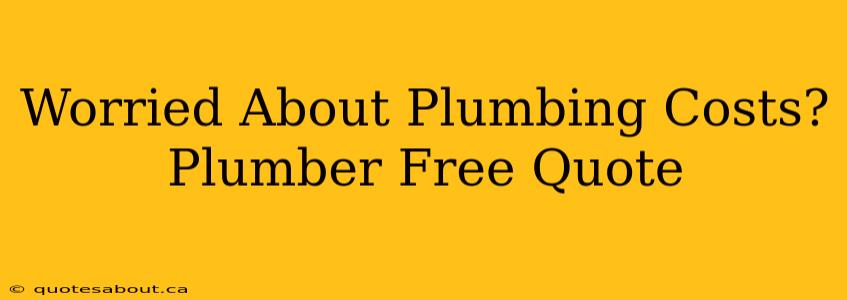Facing a plumbing emergency or planning a renovation? The unexpected expense of plumbing repairs or installations can be daunting. Many homeowners worry about the cost before even contacting a plumber. This comprehensive guide will address your concerns and help you navigate the world of plumbing costs, ensuring you get the best value for your money. We'll explore typical plumbing costs, factors influencing price, and how to obtain a free quote to alleviate your financial anxieties.
What are the Average Costs of Common Plumbing Services?
Plumbing costs vary significantly depending on the type of service, location, and complexity of the job. However, understanding average costs can give you a reasonable expectation. Keep in mind these are estimates, and it's crucial to get a personalized quote.
-
Toilet Repair: A simple toilet repair, like fixing a running toilet, might cost between $100 and $300. More extensive repairs, such as replacing the entire toilet, could range from $200 to $500 or more, depending on the fixture's quality.
-
Sink Repair/Replacement: Repairing a leaky faucet typically costs between $50 and $200, while replacing a sink could range from $200 to $800, depending on the sink's material and complexity of installation.
-
Drain Cleaning: The cost of drain cleaning varies depending on the severity of the clog and its location. Expect to pay anywhere from $75 to $300 for a standard drain cleaning. Severe clogs requiring hydro-jetting can cost significantly more.
-
Water Heater Repair/Replacement: Repairing a water heater can range from $150 to $400, while replacing it can cost anywhere from $800 to $2000 or more, depending on the type and size of the water heater.
-
Garbage Disposal Repair/Replacement: Repairing a garbage disposal might cost between $100 and $200, while replacing it can cost between $200 and $500.
What Factors Influence Plumbing Costs?
Several factors contribute to the final cost of plumbing services:
-
Labor Costs: Plumbers' hourly rates vary depending on their experience, location, and the demand for their services.
-
Materials Costs: The cost of materials, such as pipes, fittings, and fixtures, can significantly impact the overall price. Higher-quality materials generally cost more.
-
Complexity of the Job: Simple repairs typically cost less than complex installations or emergency services.
-
Accessibility: Difficult-to-reach areas may increase labor costs due to the extra time and effort required.
-
Emergency Service: Emergency plumbing calls often involve higher costs due to the urgency and overtime labor.
-
Location: Plumbing services in densely populated urban areas generally cost more than in rural areas.
How Can I Get a Free Plumbing Quote?
Obtaining a free quote is a crucial step in managing your plumbing expenses. Reputable plumbing companies offer free estimates to help homeowners understand the costs involved before committing to any services.
How to Prepare for a Free Quote:
- Clearly describe the problem: Before contacting a plumber, try to provide as much detail as possible about the plumbing issue. This helps the plumber assess the situation and provide a more accurate quote.
- Schedule an appointment: Most plumbers will schedule a convenient time to visit your property and assess the situation.
- Ask questions: Don't hesitate to ask the plumber any questions you have about the cost breakdown, the materials used, or the warranty offered.
What are the common plumbing problems?
Common plumbing problems range from minor inconveniences to major emergencies requiring immediate attention. Some of the most frequent issues include:
- Leaky Faucets: Dripping faucets not only waste water but also increase your water bill.
- Clogged Drains: Slow-draining sinks, tubs, and toilets are often caused by clogs that require professional attention.
- Running Toilets: A constantly running toilet wastes a considerable amount of water and money.
- Low Water Pressure: Low water pressure can affect several fixtures and appliances in your home.
- Water Heater Issues: Malfunctioning water heaters can lead to no hot water or even leaks.
What are the signs that I need a plumber?
It's important to know when to call a professional plumber. While minor issues might be manageable with DIY solutions, certain signs necessitate the expertise of a licensed plumber:
- Persistent leaks: Any persistent leak, no matter how small, should be addressed by a professional to prevent further damage.
- Severe clogs: If you've tried various drain-clearing methods without success, it's time to call in a plumber.
- Low water pressure affecting multiple fixtures: This could indicate a problem with the main water line.
- Unusual noises from pipes: Banging, gurgling, or whistling sounds from pipes might signal a more serious underlying issue.
- Water heater malfunctions: Any issues with your water heater, such as lack of hot water, unusual noises, or leaks, require professional attention.
By understanding the average costs, influencing factors, and how to obtain free quotes, you can confidently address your plumbing needs without the unnecessary stress of unexpected expenses. Remember to always choose a licensed and reputable plumber to ensure quality workmanship and protect your investment.

